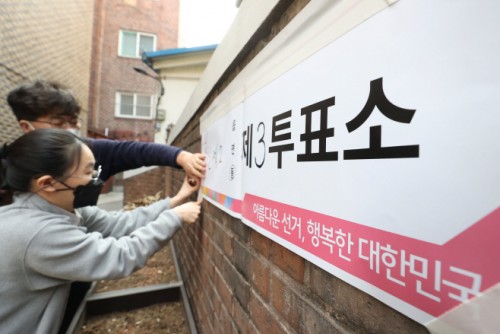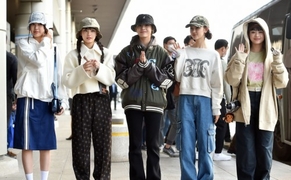 |
| Officials post a notice at a polling station in Jongno-gu, Seoul, on March 8, 2022./ Source: Yonhap News |
AsiaToday reporter Jeong Geum-min
Wednesday is the time of deciding the nation’s president who will lead South Korea for the next five years. As the two main candidates have been locked in a neck-and-neck battle until March 4 when the National Election Commission (NEC) prohibited polling agencies from announcing new survey results, the outcome of the election is yet hard to predict. Attention is now focused on whether the liberal candidate of the ruling party will succeed or the main opposition party’s candidate will succeed to change the regime in five years.
The 20th presidential election will be held on Wednesday from 6 a.m. to 7:30 p.m. at 14,464 polling stations across the country. The total number of voters for the upcoming election is 44,197,692, an increase of 203,445 from the general election in 2020 and 1,717,987 more than the 19th presidential election in 2017.
Among the voters, 16,323,602 voters filled their ballots during the two-day early voting. The turnout from the early voting – Friday to Saturday – hit a record high of 36.93 percent.
General voters can cast their ballots from 6 a.m. to 6 p.m. on Wednesday, while voting for COVID-19 patients and those in quarantine will be available from 6 p.m. to 7:30 p.m.
In previous presidential elections, the counting of votes usually ended around 6-7 a.m. the next day, but this time, the voting time is likely to be longer than before as a large number of COVID-19-positive voters and those in quarantine are expected to appear, raising the possibility that both the counting and closing times will be delayed.
After the voting, all the ballot boxes will be transferred to 251 counting stations escorted by the police.
Initially, 14 candidates including Lee Jae-myung of the ruling Democratic Party (DP), Yoon Suk-yeol of the main opposition People Power Party (PPP), and Sim Sang-jung of the minor progressive Justice Party registered for this presidential race, but Ahn Cheol-soo of the minor opposition People’s Party and the minor New Wave Party Kim Dong-yeon dropped out of the race.
Among them, Lee Jae-myung and Yoon Suk-yeol have been engaged in a fierce competition against each other until the last minute. The two major parties have been criticized for leaving a spark of division in the public opinion.
In the end, no matter who wins, the nation’s next president will be in charge of addressing inflation, low economic growth, North Korea’s missile launch, and the pandemic.
#election day #president #Lee Jae-myung #Yoon Suk-yeol
Copyright by Asiatoday
Most Read
-
1
-
2
-
3
-
4
-
5
-
6
-
7





















